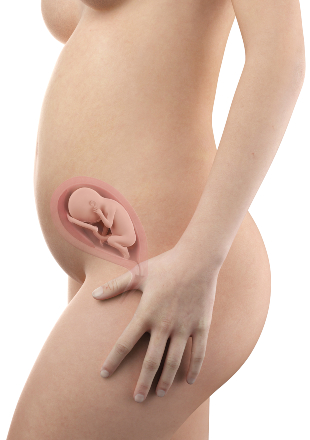Welcome to Week 19, nearly halfway through your pregnancy journey! This week, you might find yourself feeling more connected to the tiny life growing inside you. Many moms say they start to truly show around this time, and if you haven’t felt those first gentle baby movements just yet, you’re likely to feel little flutters very soon. Every little change can feel exciting and new—it’s all part of your baby’s incredible growth and your own transition into motherhood.
By Week 19, your baby is about the size of a mango, weighing around 8 ounces and measuring about 6 inches long. Inside your belly, your little one is busy practicing important skills, from moving their tiny arms and legs to developing senses like taste, touch, and hearing. In fact, your baby may even be able to hear your heartbeat or the sound of your voice, so don’t hesitate to speak or sing to them—your voice is comforting already.

Physically, you may notice some new symptoms this week. Your growing belly might make your back ache a bit more, and you could start to spot a dark line (called the linea nigra) running down your belly—a normal part of pregnancy for many women. Some moms experience mild swelling in their hands and feet as the body holds on to extra fluid. Try to rest and put your feet up when you can, and don’t forget to stay hydrated.
This is also a time when many women have their mid-pregnancy ultrasound, sometimes called the anatomy scan. This detailed check-up lets your healthcare provider look closely at your baby’s growth and development, and you may even find out if you’re having a boy or a girl—if you want to know, of course! Remember, this scan is a wonderful chance to see your baby and ask any questions you might have about their health or your own.
Take a moment to appreciate how far you’ve come. Every week brings new changes, and it’s normal to feel a mix of excitement, curiosity, and even a little worry. Listen to your body, keep the lines of communication open with your healthcare team, and know that you’re doing an amazing job nurturing your growing baby.
Your Baby’s Development This Week
Welcome to week 19! You’re nearly halfway through your pregnancy, and incredible things are happening inside your belly. Your baby is now about the length of a mango—measuring 6 to 6.3 inches from head to bottom and weighing roughly 11 ounces. Every week brings a new milestone in your baby’s journey, and this one is full of amazing changes you can be excited about.
This is a special week because your baby’s brain is making connections at lightning speed. These connections are especially busy in the areas that will control the senses—touch, smell, taste, sight, and hearing. Your baby is starting to respond to the world in subtle ways!
- Hearing the World: Tiny ears are fully formed enough that sounds are starting to reach your baby. They probably pick up the steady rhythm of your heartbeat and the gentle swishing noise of your blood moving around. Some studies suggest babies can even react to loud or familiar sounds. If you catch yourself singing, don’t be surprised if your little one is already listening in!
- Feeling Protected: Your baby’s delicate skin is now covered with a creamy, white layer called vernix caseosa. This special coating keeps your baby’s skin soft and safe from the amniotic fluid. Over this, a soft layer of hair, called lanugo, acts like a cozy blanket—helping to hold the vernix in place.
- Movements You Can Feel: At this stage, babies get pretty active! Their tiny muscles are strengthening as they twist, wiggle, and even do the occasional somersault. You may start to feel “quickening”— those first gentle flutters or taps inside your tummy. Every baby’s movements are unique, but many moms find this to be one of the sweetest moments in pregnancy. If you don’t notice anything quite yet, don’t worry—those kicks are just around the corner.
- Shaping Up: Your baby’s face is becoming more defined. If you have an ultrasound around now, you might get a glimpse of their tiny nose, lips, and ears. Reproductive organs are also developing, and in some cases, you might find out your baby’s sex during the mid-pregnancy scan.
Inside, your baby is making progress every day. Their bones are getting harder, and their arms and legs look more in-proportion to their body than ever before. Fingernails and toenails keep growing, and if you could peek inside, you’d see tiny fingers that are now strong enough to form a fist. Plus, the nervous system continues to mature, laying the groundwork for all the things your little one will learn after birth.
This stage is not only about your baby’s physical growth: all the wiggling and stretching helps their brain and muscles coordinate. Even though your baby won’t remember it, every movement is important practice for the big, active world outside your womb.
Be sure to take it easy and enjoy this stage. Looking after yourself with nourishing food, restful sleep, and regular checkups will give your baby the best start possible. Remember, each week brings exciting new changes. You’re doing a wonderful job as you help your baby grow!
Changes in the Mother’s Body
As you reach week 19 of pregnancy, your body is adapting in new and noticeable ways to support your growing baby. Many moms describe this as a time when pregnancy starts to feel more “real,” both because of visible changes and the new sensations that come with them. It’s perfectly normal to have questions or concerns, and each symptom is a sign that your body is working hard to nurture your little one.
By now, you might notice your belly is more prominent—your uterus has grown up to about the level of your belly button. For many women, this is when they start wearing more comfortable maternity clothes to accommodate their changing shape. Don’t be surprised if friends and family are beginning to notice your pregnancy glow!
Here are some common changes you might experience this week:
- Feeling the Baby Move: One of the most exciting milestones—many moms first feel gentle movements called “quickening” around this time. These tiny flutters or bubbles are your baby’s way of saying hello! Some moms describe it like butterflies in their stomach or a soft tapping sensation.
- Stretching Sensations: As your belly grows, the tissues and muscles supporting your uterus also stretch. You might notice occasional aches or sharp pains along the sides of your lower belly, known as round ligament pain. While uncomfortable, these aches are generally harmless.
- Skin Changes: Pregnant skin is especially sensitive. A faint dark line, called the linea nigra, may start to appear from your belly button down. Your nipples and areolas might become darker as well. Some women also notice that their skin feels itchier due to stretching—gentle moisturizers and staying hydrated can help.
- Body Aches and Discomforts: With your body’s changing center of gravity, back pain is common. You may also experience occasional leg cramps, particularly at night. Light stretching, gentle movement, and supportive footwear can offer relief.
- Breast Changes: Your breasts may feel fuller or more tender, preparing for breastfeeding. Small bumps (called Montgomery glands) on your areolas might become more pronounced, which is completely normal.
- Increased Energy: Many women find their energy picks up during the second trimester. Take advantage of this “honeymoon” phase of pregnancy by enjoying gentle exercise, eating well, and connecting with loved ones.
Emotionally, you might feel a mix of excitement, curiosity, and sometimes anxiety about what lies ahead. Remember that mood swings can be part of pregnancy, thanks to hormonal shifts. If you ever feel overwhelmed, reach out to your healthcare provider or talk with someone you trust.
Most importantly, listen to your body. Try to get plenty of rest, stay hydrated, and eat nourishing meals. If you notice anything unusual—such as severe pain, bleeding, or concerning symptoms—contact your provider for advice. Every pregnancy is unique, but you’re not alone on this journey. Your healthcare team is there to support you every step of the way.
What Medical Checkups and Screenings Happen at Week 19?
At 19 weeks pregnant, it’s a great time to connect with both your baby and your healthcare provider. Your checkups this week focus on making sure both you and your growing little one are healthy, comfortable, and on track.
Here’s what you can expect when you visit your healthcare provider around this stage:
- Detailed Ultrasound (Anatomy Scan): This special ultrasound, often called the “mid-pregnancy scan,” takes a close look at how your baby is developing inside the womb. The technician will carefully check your baby’s organs—like the brain, heart, kidneys, and spine—to make sure everything is growing as expected. It’s also common to get a peek at your baby’s face and movements, and if you want, you can often find out your baby’s sex at this appointment. Many parents find this scan both exciting and reassuring.
- Checking the Placenta and Amniotic Fluid: During the ultrasound, the doctor or sonographer will also check where the placenta is sitting in your uterus and make sure you have the right amount of amniotic fluid (the “cushion” around your baby). This helps spot anything that might need extra attention as your pregnancy continues.
- Routine Health Checks: Your provider will measure your blood pressure, check your weight, and test your urine. These easy checks give clues about your overall health and can help catch early signs of things like high blood pressure or gestational diabetes—even before you feel any symptoms.
- Measuring Your Growing Bump: The size of your belly (measured as the distance from your pubic bone to the top of your uterus) can be checked for the first time around now. This helps your provider make sure your baby is growing at a healthy rate.
- Questions and Conversation Time: Your prenatal visits are also about you—how you’re feeling, any physical discomforts (like back pain or leg cramps), and emotional ups and downs. Don’t hesitate to share any new aches, worries, or questions. Even if something seems small, it’s always worth mentioning. Building a strong partnership with your provider helps you feel more confident from week to week.
- Optional Screenings (If Needed): Depending on your medical history or family background, your provider might offer you special blood tests or genetic screenings around this time. For some women, an amniocentesis—a test that checks the baby’s genes by gently collecting some fluid—might be discussed, especially if earlier screenings showed something unusual or if you’re at higher risk for certain genetic conditions.
- Tips for Your Clinic Visit: Many moms find it helpful to keep a small notebook or use a notes app on their phone for questions in between visits. That way, you won’t forget to ask about anything that’s on your mind when you see your provider. Feel free to write down what you learn or ask for details if something isn’t clear. Your comfort and understanding are so important!
Remember, each pregnancy is unique. Your doctor or midwife may offer extra checks, schedule the anatomy scan a little earlier or later, or suggest other tests based on your individual health needs. Never feel shy about asking why a test is being done—your care team is there to support you every step of the way.
Nutritional Tips and Physical Exercise
At week 19, you and your baby are growing together—and what you eat, drink, and how you move can make a big difference. Let’s look at practical ways to nurture your body and your little one during this exciting stage.
- Colorful Plates for Extra Nutrients Try to eat a rainbow of fruits and vegetables throughout the week. Each color brings its own set of vitamins and minerals. For example, dark leafy greens like spinach or kale give you iron and folate, while orange foods like carrots and sweet potatoes are great for vitamin A.
- Smart Snacking Snack on foods that give steady energy and nutrition—think low-fat yogurt with berries, nut butter on whole grain toast, or a handful of almonds with an apple. These snacks are not just filling, but also support your baby’s healthy development.
- Protein Power Include protein at each meal, such as lean chicken, eggs, beans, tofu, or fish (just avoid high-mercury types). Protein helps your baby’s growing muscles and organs.
- Choosing Whole Grains Switching to whole wheat bread, brown rice, or oatmeal can boost your fiber, which helps keep constipation in check—a common issue around this week.
- Hydration Reminders Carry a water bottle with you and try sipping regularly. Drinking enough water supports your increased blood volume and can help lessen swelling or headaches.
- Salt and Sugar in Moderation Keep an eye on salty snacks and sugary drinks. Too much salt can make swelling worse, while too much sugar adds empty calories. Opt for natural sweetness from fruit and season foods with herbs and spices instead of extra salt.
- Listening to Your Body If you’re suddenly put off by certain foods or develop new cravings, it’s normal! Just make sure your “yes” foods are mostly nutritious, and let your healthcare provider know about any strong or unusual cravings.
Gentle Exercise for Energy and Comfort
- Walking A daily walk, even for 20–30 minutes, helps boost circulation, ease backaches, and lifts your mood. Wear comfy shoes and take it slow if you need to.
- Prenatal Yoga or Stretching Simple stretches or joining a prenatal yoga class (in person or online) can help ease those round ligament pains and keep you flexible. Remember to avoid poses that involve lying flat on your back or deep twisting motions.
- Pelvic Floor Exercises (Kegels) These can help strengthen the muscles that support your growing womb and prepare your body for delivery. Just squeeze the muscles you use to stop the flow of urine, hold for a few seconds, and release—repeat a few times each day.
- Short Movement Breaks If you sit at a desk or relax on the couch, try to stand up and stretch every hour or so. This can reduce swelling in your legs and keep your energy up.
- Listen to Your Body If you feel dizzy, out of breath, or notice pain, slow down and rest. Never push through discomfort, and check with your doctor before starting something new.
Remember, no two pregnancies are the same. If you have any health concerns or questions about exercise and eating, your healthcare provider can help you make a plan that feels right for you. Take care of yourself—your body is doing something amazing!
Weekly Checklist
At 19 weeks, your pregnancy is blooming, and both you and your baby are hitting some exciting milestones. Here’s a friendly, supportive checklist for Week 19 to help you feel confident about what to do and what to look for during this meaningful stage:
- Schedule or Attend Your Anatomy Scan: If you haven’t already, book your mid-pregnancy ultrasound. This detailed scan helps check on your baby’s growth, organs, and development, and can even reveal your baby’s sex if you want to know.
- Start Listening and Talking to Your Baby: Your little one may begin to hear your voice and sounds around them. Try talking, singing, or playing gentle music to bond and comfort your baby.
- Notice Baby Movements: Pay attention to any gentle flutters or bubbles in your belly. This “quickening” means your baby is becoming more active, and every mom feels it a little differently.
- Support Your Changing Body: You might feel stretching or even sharp twinges in your lower belly as your uterus grows. If it’s uncomfortable, try gentle stretches, change positions slowly, or use a support pillow for relief.
- Stay Comfortable and Rested: As your bump grows, sleeping on your side helps blood flow to your baby. Experiment with extra pillows behind your back or between your knees for support and better sleep.
- Keep Drinking Water: Staying hydrated is especially important this week to support your increased blood volume and help prevent leg cramps.
- Give Your Skin Some TLC: Your skin may itch or stretch. Use a gentle moisturizer and wear loose, breathable clothes. Notice any new marks or the linea nigra line appearing on your belly—both are completely normal!
- Choose Nutritious Snacks: Include iron-rich foods like beans, spinach, or lean beef to keep your energy up. Pair them with foods high in vitamin C, like oranges or strawberries, to help your body soak up the iron.
- Ask About Prenatal Classes: Now is a great time to look into classes for childbirth, breastfeeding, or baby care. These workshops can help you prepare, meet other parents, and answer any questions you may have.
- Check In On Your Emotions: Mood swings can be normal as hormones shift. Take time for yourself, and talk with your partner or a trusted friend if you’re feeling overwhelmed.
- Keep Track of Questions: Jot down anything you’re unsure about—whether it’s about your body or your baby—so you’re ready for your next doctor’s visit.
Remember, every pregnancy is unique. Take care of yourself and don’t hesitate to reach out to your healthcare provider with any concerns or curiosities. You’re doing an amazing job!
When to Call Your Doctor
Your safety and your baby’s well-being are always top priorities. Most changes in your body are normal parts of pregnancy, but sometimes certain signs mean you should get in touch with your healthcare provider. If you notice anything that feels unusual for you, it’s always okay to reach out—you’re never bothering your provider by asking questions.
Here’s when it’s important to call your doctor during week 19:
- Bleeding or spotting: If you notice any bleeding from your vagina, especially if it is more than a small amount or comes with pain, let your doctor know right away.
- Severe stomach pain: Occasional mild aches are common, but if you have strong, persistent pain that doesn’t go away or gets worse, call for advice.
- Severe headaches or vision changes: If you develop a sudden, unrelenting headache, see flashing lights, or have blurry vision, this could signal a problem that needs quick attention.
- Sudden swelling: Some swelling in feet and ankles is normal in pregnancy, but if you notice your hands, face, or eyes becoming puffy quickly—especially with a headache or vision changes—contact your provider.
- Leaking fluid: If you feel a constant trickle or sudden gush of clear or pale yellow fluid from your vagina, it could be your water breaking early. Don’t wait to call.
- Fever: A high temperature (over 100.4°F or 38°C) that doesn’t go away, especially with chills or feeling unwell, should be checked out.
- Painful urination or signs of infection: If it burns or stings when you pee, or if you notice foul-smelling or cloudy urine, these might be signs of a urinary tract infection.
- Fewer baby movements: If you have started feeling your baby move and suddenly notice they are less active or not moving as much as before, reach out to your provider.
- Shortness of breath or chest pain: Trouble taking a deep breath, chest pain, or a racing heartbeat that doesn’t settle down needs prompt attention.
- Vomiting that won’t stop or unable to keep fluids down: If you find you can’t keep water or food down and feel very weak or dizzy, call for help so you don’t get dehydrated.
Remember, you know your body best. If something feels off, or you simply feel uneasy, trust your instincts. Your healthcare team is there to support you, whether you have a quick question or a big concern. Don’t hesitate to reach out — every question is important when it comes to your health and your baby’s.
Preparations for Baby
This is an exciting time, and planning ahead can help you feel calmer and more in control as your family grows. Even small steps now can make a big difference later on. Here are a few ways you can start preparing emotionally and around the house as you get closer to meeting your little one.
- Create a calming space: If you haven’t already, start thinking about where your baby will sleep. You don’t need to have a finished nursery right away—even setting up a cozy bassinet or crib in your bedroom is a great way to begin.
- Learn about newborn care: Pick up a trustworthy baby care book or sign up for a virtual newborn class. Getting familiar with basics like diapering, feeding, and soothing can ease first-time jitters.
- Connect with support: Talk openly with your partner or loved ones about how everyone can pitch in once the baby arrives. Consider who you might call if you need help or a break in the early weeks.
- Write down questions: If there are things you’re unsure about—like hospital bag essentials, baby gear, or your hospital’s procedures—jot them down to ask at your next checkup. Your care team wants to support you.
- Reflect on feelings: It’s natural for emotions to go up and down during pregnancy. Setting aside a quiet moment each week to check in with yourself or share your thoughts with someone you trust can help you feel more grounded.
- Light decluttering: Little by little, consider finding extra space by clearing out an area for baby clothes, diapers, and a few essentials. There’s no rush—doing a bit each week keeps it manageable.
- Practice self-care: Simple joys like reading, warm baths, or gentle stretching can recharge you. Caring for yourself now sets the tone for nurturing your new arrival later.
- Start a keepsake: Some parents find comfort in starting a journal or taking weekly photos to remember this special journey. It can be a sweet way to look back and see how far you’ve come.
Remember, there’s no perfect way to prepare—what matters most is giving yourself permission to move at your own pace. You’re already doing an amazing job getting ready for your baby’s big debut.
Citations and References
- American College of Obstetricians and Gynecologists (ACOG) – Guidance on prenatal care, nutrition, anatomy scan, and fetal development for the second trimester. Visit Source
- Mayo Clinic – Details on fetal growth, maternal changes, ultrasound, and week-by-week pregnancy developments. Visit Source
- Centers for Disease Control and Prevention (CDC) – Safety guidelines for food, supplements, and physical changes during pregnancy. Visit Source
- World Health Organization (WHO) – Recommendations on antenatal care, nutrition, and supplement intake for pregnant women. Visit Source
- Cleveland Clinic – Information on typical symptoms, fetal milestones, and expectant mother advice for week 19. Visit Source
- National Institutes of Health (NIH) – MedlinePlus – Resources on healthy eating, vitamins, and what to expect in the second trimester. Visit Source










